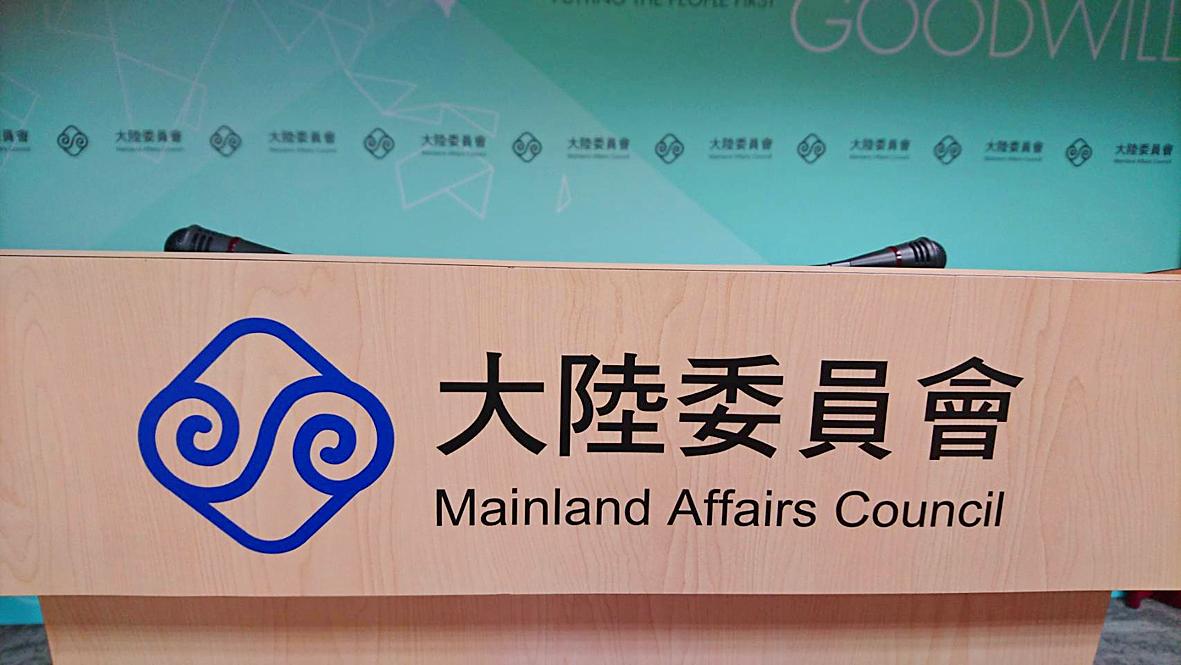Taiwanese officials in Hong Kong have been told that their visas would not be renewed if they do not sign a document supporting Beijing’s claim to Taiwan under its “one China” principle, sources have said.
Several officials at Taiwan’s de facto Hong Kong consulate who were due to renew their visas have been asked by the Hong Kong government to sign the document, a senior Taiwanese official with knowledge of the matter told Reuters.
The move is unprecedented and presents an “unnecessary political obstacle” for Taipei-Hong Kong ties, the official said.

Photo: Chung Li-hua, Taipei Times
“They won’t issue the visa if we don’t sign the document,” the official said, declining to be named due to the sensitivity of the matter. “We will try our best to defend our stance. Our representatives in Hong Kong will hold fast to their position.”
The Hong Kong Immigration Department did not immediately respond to a request for comment.
Mainland Affairs Council Minister Chen Ming-tong (陳明通) on Thursday said that the Hong Kong government is establishing unnecessary red tape outside of established bilateral regulations recognized by Taipei and Hong Kong, adding that Taiwan would “never accept” politically motivated preconditions.
Chen made the remarks when asked about the Hong Kong government reportedly demanding that the Taipei Economic and Cultural Office in Hong Kong sign a document agreeing to Beijing’s “one China” principle before the visa of Acting Representative to Hong Kong Kao Ming-tsun (高銘村) would be renewed.
While declining to confirm the report, Chen said that the Hong Kong government had “set up an unnecessary hurdle.”
Taipei has refused the demand and Kao is returning to Taiwan, the sources said, adding that despite not having a representive on site, the office would be maintained until the situation becomes untenable.
Taiwan would resolutely uphold its national interests and the dignity of Taiwanese in light of the controversial national security legislation imposed by Beijing in Hong Kong, the council said.
Stating that Taiwan seeks to function normally in Hong Kong and maintain normal interactions, the council urged the Hong Kong government to return to established norms agreed on by both sides and to maintain goodwill.
The office has five divisions — consular affairs; news and culture; general; economy; and contact — and its officials are on three-year rotations.
The consular affairs and general divisions are staffed by council officials, while the news and culture division is staffed by the Ministry of Culture’s Kwang Hwa Information and Culture Center.
Of the office’s five division heads, only Economy Division Director Ni Po-chia (倪伯嘉) remains, although the office’s consular and visa services are ongoing, sources said.
Consular Affairs Director Chou Chii-jui (周家瑞) and General Division Director Lee Chin-mei (李晉梅) have also returned Taiwan because of expired work visas, sources said, adding that the Hong Kong government has yet to respond to the office’s requests to extend their visas.
Taiwan maintains its stance that it is an independent and sovereign nation, Premier Su Tseng-chang (蘇貞昌) said yesterday, adding that Taiwan greatly welcomes capital or talented people wishing to relocate from Hong Kong.

Right-wing political scientist Laura Fernandez on Sunday won Costa Rica’s presidential election by a landslide, after promising to crack down on rising violence linked to the cocaine trade. Fernandez’s nearest rival, economist Alvaro Ramos, conceded defeat as results showed the ruling party far exceeding the threshold of 40 percent needed to avoid a runoff. With 94 percent of polling stations counted, the political heir of outgoing Costa Rican President Rodrigo Chaves had captured 48.3 percent of the vote compared with Ramos’ 33.4 percent, the Supreme Electoral Tribunal said. As soon as the first results were announced, members of Fernandez’s Sovereign People’s Party

EMERGING FIELDS: The Chinese president said that the two countries would explore cooperation in green technology, the digital economy and artificial intelligence Chinese President Xi Jinping (習近平) yesterday called for an “equal and orderly multipolar world” in the face of “unilateral bullying,” in an apparent jab at the US. Xi was speaking during talks in Beijing with Uruguayan President Yamandu Orsi, the first South American leader to visit China since US special forces captured then-Venezuelan president Nicolas Maduro last month — an operation that Beijing condemned as a violation of sovereignty. Orsi follows a slew of leaders to have visited China seeking to boost ties with the world’s second-largest economy to hedge against US President Donald Trump’s increasingly unpredictable administration. “The international situation is fraught

MORE RESPONSIBILITY: Draftees would be expected to fight alongside professional soldiers, likely requiring the transformation of some training brigades into combat units The armed forces are to start incorporating new conscripts into combined arms brigades this year to enhance combat readiness, the Executive Yuan’s latest policy report said. The new policy would affect Taiwanese men entering the military for their compulsory service, which was extended to one year under reforms by then-president Tsai Ing-wen (蔡英文) in 2022. The conscripts would be trained to operate machine guns, uncrewed aerial vehicles, anti-tank guided missile launchers and Stinger air defense systems, the report said, adding that the basic training would be lengthened to eight weeks. After basic training, conscripts would be sorted into infantry battalions that would take

GROWING AMBITIONS: The scale and tempo of the operations show that the Strait has become the core theater for China to expand its security interests, the report said Chinese military aircraft incursions around Taiwan have surged nearly 15-fold over the past five years, according to a report released yesterday by the Democratic Progressive Party’s (DPP) Department of China Affairs. Sorties in the Taiwan Strait were previously irregular, totaling 380 in 2020, but have since evolved into routine operations, the report showed. “This demonstrates that the Taiwan Strait has become both the starting point and testing ground for Beijing’s expansionist ambitions,” it said. Driven by military expansionism, China is systematically pursuing actions aimed at altering the regional “status quo,” the department said, adding that Taiwan represents the most critical link in China’s